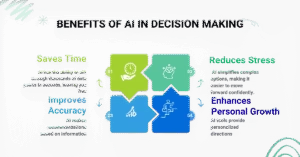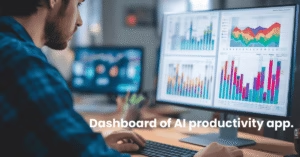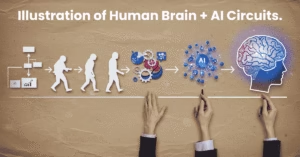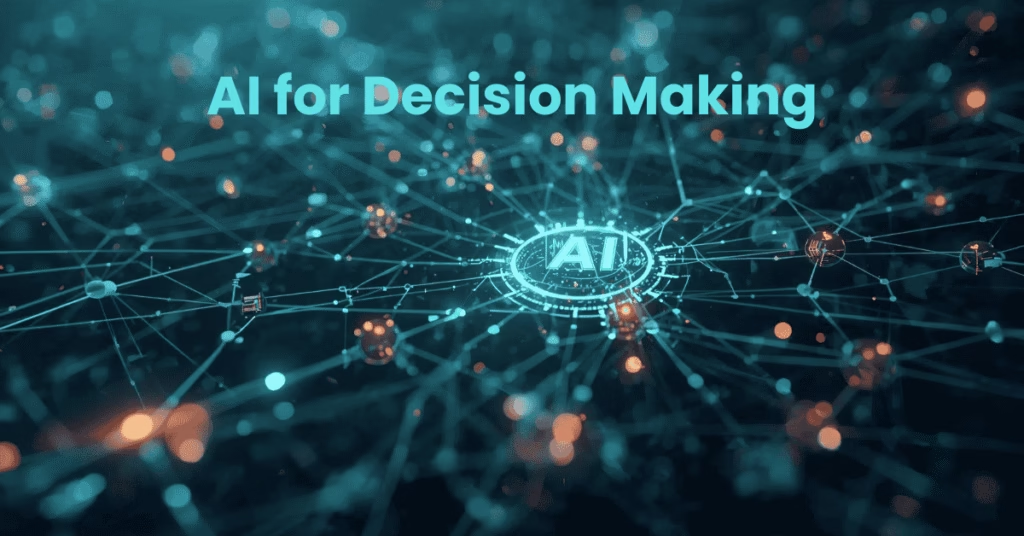Table of Contents
Introduction
Each day, we have hundreds of decisions to make—some insignificant, such as what to have for breakfast, and others life-altering, such as changing careers or creating a business. The catch is that daily decision-making results in decision fatigue, a type of stress that lowers productivity and well-being. AI for Decision Making: Smarter choices in Less Time , 2025 Guide
This is where AI for decision making steps in. AI, through the use of sophisticated algorithms, can process information, identify the best choice, and assist us in making decisions quicker and with greater confidence. From choosing the most suitable productivity software, stress management, or career planning, AI-driven decision support systems are revolutionizing the way we live.
Here’s What you Learn in this guide
- What AI decision making Actually is
- The benefits and risks of using AI for choices.
- Real-world examples and tools you can start using today.
- How to balance AI insights with your intuition.
- Future trends in AI decision support for personal development.
👉 If you’re already exploring AI in stress management or productivity tools, this post will help you take the next step: using AI to make better, faster, and smarter choices.
What is AI for Decision Making?
AI decision making is the application of artificial intelligence algorithms to aid or amplify human decisions. Rather than calculating each possibility manually, AI can:
- Gather and process data.
- Recognize patterns we can’t see.
- Offer or forecast the best steps.
For example:
- Google Maps recommends the quickest route based on current traffic.
- Financial AI apps suggest saving or investment plans.
- AI life coaching software (such as ChatGPT or Pi.ai) gives personal growth choices.
Contrary to complete automation, in which equipment operates independently without humans, AI choice assistance is teamwork—you are still the choice maker, but with AI assistance.
🔗 Related: AI Coaching Ethics Guidelines: What Coaches Must Know in 2025
Benefits of AI in Decision Making
1. Saves Time
Humans spend hours (sometimes days) researching possibilities. AI has the ability to sift through thousands of data points in seconds, leaving you free to pursue what is most important.
2. Reduces Stress
According to Psychology Today, decision fatigue contributes to anxiety and procrastination. AI simplifies complex options, making it easier to move forward confidently.
3. Improves Accuracy
AI makes recommendations based on information-driven trends, minimizing the likelihood of errors due to bias or ignorance.
4.Enhances Personal Growth
When AI tools provide personalized directions (e.g., a study routine, a stress-reduction program, or timesaving techniques), they speed up self-development.

🔗 Related: AI for Stress Management: Simple Ways to Feel Calm Every Day
Practical Examples of AI Decision Making in Daily Life
AI Productivity Tools for Time Management
Programs such as Notion AI and Motion can schedule your day automatically, prioritize tasks for you, and even reschedule meetings when there are conflicts.
AI Prompts for Motivation
Tools like ChatGPT generate motivational quotes, affirmations, or personalized pep talks to help you push through low-energy days.
🔗 Related: AI Tools for Personal Growth
AI for Financial Choices
Budgeting tools such as Cleo or YNAB AI assist you in monitoring your spending, whereas investment sites like Betterment advise portfolios in line with your objectives.
AI Career Planning
Sites such as Coursera’s AI advisor propose courses aligned with your study path and professional interests.

Top AI Decision-Making Tools in 2025
Here are some tools you can use today to improve your daily choices:
- Notion AI – for prioritizing work tasks.
- Otter.ai – summarizes meetings so you can act on insights quickly.
- Pi.ai (Personal AI) – for personal life advice and reflections.
- ChatGPT / Claude – brainstorming ideas and weighing pros/cons.
- Replika AI – emotional support and lifestyle decision assistance.
💡 Tip: Always test multiple tools. What works for productivity may not work for emotional guidance.
How to Use AI Wisely in Decision Making
While AI can be powerful, you should balance it with human intuition. Here’s how:
- Use AI for data, not for values. AI can’t define your priorities; it can only show patterns.
- Cross-check recommendations. Avoid blindly following AI—review its reasoning.
- Keep intuition central. Your unique context, values, and emotions matter.
Future of AI in Decision Making (2025–2030)
By 2030, AI decision making will probably transform into personalized AI mentors:
- Predictive assistants that recommend lifestyle decisions before you even think about them.
- AI coupled with wearables to track health and recommend preventive measures.
- AI coaches integrating emotional support with productivity planning.

FAQs
Q1: Can AI make better decisions than humans?
AI is capable of processing large amounts of data at speed, but human context and values are needed for final judgment.
Q2: Is AI for decision making safe?
Most decision-making tools are safe if used as support tools. Check results before taking action.
Q3: What are the best free AI decision apps?
Notion AI, ChatGPT free version, and Pi.ai are great places to start.
Q4: Will AI replace human judgment?
No. AI is just going to be a guide, not that the final decision rests with humans.
Conclusion + CTA
Decision-making AI is not replacing human intelligence, but rather augmenting it. By blending AI insights into your own intuition, you can decide quicker, less stress, and match your decisions to your personal growth objectives.
👉 Want to explore more? Check out:
📩 CTA: Subscribe to MindLiftly to get weekly guides on AI, productivity, and personal growth.
External Refrences
MIT Sloan Management Review – AI and Decision Making..
Harvard Business Review – How AI Is Changing Business Decisions





